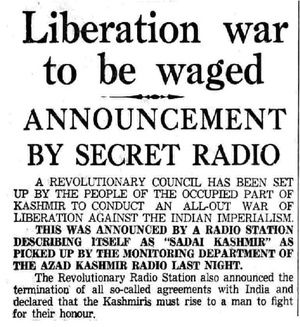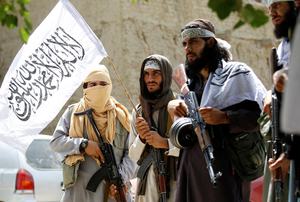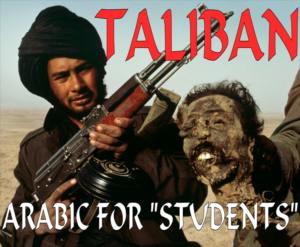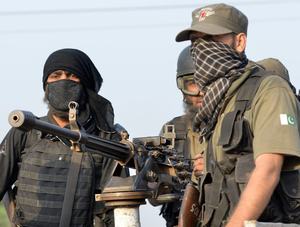[Jpost] Pakistan's intelligence agencies have disclosed in their joint report a notable surge in the smuggling of Iranian oil within the country.
The report, submitted to the Ministry of Petroleum on Thursday, sheds light on the alarming escalation of this illicit activity. “There was a significant reduction in this illegal trade during the caretaker government, but after the recent general elections (held in February 2024), illegitimate trade has now escalated by a staggering 67%,” the report stated.
A troubling connection between militant groups in the country’s southwestern Balochistan province and the profits generated from oil smuggling was also revealed in the report. It suggests that banned Baloch-armed organizations operating in the restive region, including the Baloch Liberation Army (BLA) and Baloch Liberation Front (BLF), are directly involved in this unlawful oil trade.
According to the report, Balochistan’s thriving underground smuggling operation spans six land and sea routes across five districts. An estimated 90,000 liters of Iranian oil are smuggled daily, and around 70% of this oil makes its way to consumption hubs in Pakistan’s three other major provinces.
SMUGGLING AND THE ECONOMIC FALLOUT
The report states that “2.8 billion liters of Iranian oil, including diesel and petrol, are smuggled into Pakistan annually. This rampant smuggling has resulted in a staggering loss of at least 227 billion rupees [an estimated $816 million] to the national treasury.”
| Not to mention the loss to the Iranian government, beleaguered as they are despite being the beloved of Allah, masters of the Master Religion. |
Approximately 2.2 to 2.4 million people, constituting anywhere between 14% and 16% of Balochistan's population, rely on Iranian oil smuggling within the province, according to the report.
“Predominantly, individuals from terrorism-affected areas in southern Balochistan are engaged in this trade, primarily due to limited economic prospects in the region,” it further stated.
The 44-page report, prepared by intelligence operatives, exposes the involvement of numerous high-profile figures in this smuggling ring. Among those implicated are sitting members of the Balochistan Assembly, former provincial ministers, and influential politicians.
The report identified one hundred and five smugglers who play pivotal roles in facilitating the illegal trade, coming from 14 districts in Balochistan, including the provincial capital, Quetta. It also identified 100 corrupt officials across the country who are said to be involved in oil smuggling.
Additionally, the report highlights the complicity of 533 petrol pumps operating without proper licenses, actively participating in the sale of contraband Iranian oil.
Emphasized in the report is the urgent need for immediate, though non-specific, measures to combat the multiple threats the country faces because of this Iranian oil smuggling operation. These threats include revenue loss, depletion of foreign exchange reserves, and damage to the state's reputation.
The illicit trade of oil in Pakistan's Balochistan province is not new; it has existed for several decades already. Iranian oil smuggling predominantly occurs within the Baloch belt, characterized by challenging mountain ranges, uninhabited deserts, and a lack of industries or economic opportunities for its residents. The districts identified by intelligence agencies as prone to smuggling Iranian oil are situated within the same belt. Consequently, the sole source of employment for the local population revolves around the illegal oil trade.
According to official records, Mashkel, a desert expanse along the Pakistan-Iran border, is home to around 60,000 individuals. In this town, two to three people per household are involved in the oil smuggling trade. This makes a complete operation shutdown challenging, as the government lacks alternative solutions.
Despite repeated promises and assurances from the Pakistani government to crack down on this smuggling and illegal trade within the borders, the efforts thus far have proven ineffective in curbing this nefarious activity.
Malik Siraj Akbar, an ethnic Baloch and Washington-based expert on Balochistan issues, told The Media Line that “amid a backdrop of deprivation and underdevelopment in the Baloch regions, Baloch militants on both sides of the border have exploited these grievances to further their agendas. They attribute the backwardness of their areas and the creation of hostile environments to the central governments of both countries.”
Akbar highlighted the significant support garnered by insurgent groups among the local populace, noting that “this support often surpasses that received by the Iranian and Pakistani national armies.”
He pointed out that “both nations have responded by ramping up security measures and enhancing cooperation to combat the Baloch insurgents.” However, Akbar cautioned that such crackdowns might incentivize militants to seek alternative funding sources for their movements.
He also emphasized that the Baloch insurgency extends its impact far beyond the immediate border regions, “potentially destabilizing the broader geopolitical landscape. This situation creates opportunities for external actors to exploit vulnerabilities within the affected countries, thereby complicating efforts to establish lasting peace and security in the region.”
Expanding on this point, Akbar said that “the persistent insurgency in the Baloch regions poses significant challenges to regional security and stability. The ongoing unrest disrupts the socio-economic fabric of the affected areas and heightens tensions between neighboring countries.”
He elaborated that “the intricate interplay of socio-economic dynamics, political interests, and security concerns adds complexity to resolving the Baloch insurgency issue.”
Dr. Dost Barrech, a geostrategic analyst who teaches international relations at the University of Balochistan, told The Media Line, “The Iranian oil trade is a lifeline for 50% of the population in the Baloch belt. Enforcing a crackdown could plunge these individuals into uncertainty. With a lack of alternative skills or education, they would face the grim prospect of unemployment and financial hardship.”
He underscored the “necessity for comprehensive policymaking considering the region's complex economic and social dynamics. Investment in education and skills training programs could offer alternative avenues for livelihood, reducing dependence on a single industry.”
Barrech also said that if terrorists are involved in this illegal trade, “then this issue is a question mark for our security operatives.”
Emphasizing the importance of China's massive $400 billion investment in Iran,
| *Blink* That’s a lot of money… |
Barrech noted that a considerable amount is directed towards sectors beyond energy. Stressing the mutual need for a stable trade route between China and Iran, he said that Pakistan must seize this opportunity, advising the government to withstand American pressure.
Barrech proposed that the government “legitimize the trade of Iranian oil to bolster the economy and facilitate the development of underdeveloped regions.” He argued that this approach would foster economic growth and uplift disadvantaged areas.
“The trade of Iranian oil, often labeled as smuggling, has been a subject of prolonged discussion due to its detrimental effects on the Pakistani economy and its alleged support for Baloch armed resistance,” Hazar Khan Baloch, a Quetta-based political analyst who closely monitors border issues, told The Media Line.
“However, despite widespread acknowledgment of these issues, there has been a lack of concrete action plans to address the situation,” he added.
Baloch claimed that “the primary obstacle to implementing effective measures against this trade is the involvement of various stakeholders, including politicians and border guards. This complex web of interests often leads to a resumption of the smuggling process after temporary disruptions.”
He further asserted that the trade in Iranian oil is a significant source of employment, particularly for residents of Balochistan's border areas.
“The resurgence of Iranian oil smuggling poses significant challenges for law enforcement agencies in Pakistan. It undermines national security and fuels corruption and illicit financial flows,” he claimed.
"The involvement of government officials and politicians in this disgraceful business also contributes to a culture of impunity, where criminal elements thrive at the expense of law-abiding citizens,” Baloch added.
“As authorities grapple with this pressing issue, urgent measures are required to dismantle the intricate networks perpetuating this illegal trade and safeguarding the country's interests,” he concluded.
Qiamuddin Agha, president of the Balochistan Petroleum Dealers Association, expressed concerns about the impact of the Iranian petroleum smuggling on legal petrol pumps.
“While Iranian oil is undercutting our legitimate business, there's also a human aspect to consider. Despite the losses, we continue to operate. When the Iranian oil supply diminishes, our sales increase,” he told The Media Line, emphasizing “the need for government policies that preserve employment opportunities and do not harm legal petrol sellers, especially considering the limited business opportunities in Balochistan.”
To rejuvenate Pakistan’s national economy, leaders from both civil and military sectors came together in March to discuss and tackle the obstacles hindering financial growth in Pakistan, including smuggling, corruption, and criminal syndicates.
The civil and military leadership attended a high-level meeting chaired by Prime Minister Shehbaz Sharif, where strategies to address a range of illegal activities, such as the Iranian oil smuggling trade and criminal mafias, were carefully considered.
|
 ...a disputed territory lying between India and Pakistain. After partition, the Paks grabbed half of it and call it
...a disputed territory lying between India and Pakistain. After partition, the Paks grabbed half of it and call it 
 ...mindless ferocity in a turban...
...mindless ferocity in a turban...
 ...the once and current oppressors of Afghanistan...
...the once and current oppressors of Afghanistan... [KhaamaPress] The police in
[KhaamaPress] The police in  ...capital of Khyber Pakhtunkhwa, administrative and economic hub for the Federally Administered Tribal Areas of Pakistan. Peshawar is situated near the eastern end of the Khyber Pass, convenient to the Pak-Afghan border. Peshawar has evolved into one of Pakistain's most ethnically and linguistically diverse cities, which means lots of gunfire...
...capital of Khyber Pakhtunkhwa, administrative and economic hub for the Federally Administered Tribal Areas of Pakistan. Peshawar is situated near the eastern end of the Khyber Pass, convenient to the Pak-Afghan border. Peshawar has evolved into one of Pakistain's most ethnically and linguistically diverse cities, which means lots of gunfire...